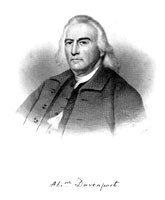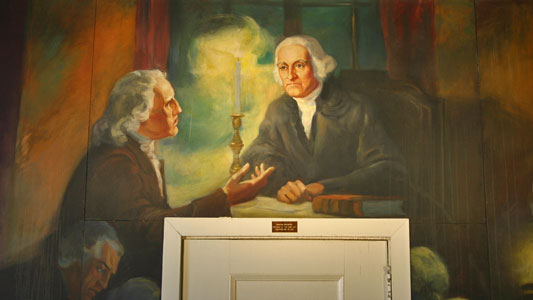
 I was trying to recall an anecdote the other day and spoke to others about it. One of them, my good friend Luke Jenner, said he had just read it in (of all places) Christopher Hitchens' God is not great and very kindly sent me a photocopy of the relevant page (page 61). Hitchens likes Davenport's attitude. You can check it out here. I also found this fuller version with another story about Abraham Davenport the man in question here. The incident was popularised in an 1868 poem by John Greenleaf Whittier. See here.
I was trying to recall an anecdote the other day and spoke to others about it. One of them, my good friend Luke Jenner, said he had just read it in (of all places) Christopher Hitchens' God is not great and very kindly sent me a photocopy of the relevant page (page 61). Hitchens likes Davenport's attitude. You can check it out here. I also found this fuller version with another story about Abraham Davenport the man in question here. The incident was popularised in an 1868 poem by John Greenleaf Whittier. See here.ABRAHAM DAVENPORT, A long-time Councillor of the colony and later of the State of Connecticut, was a man distinguished by his vigorous understanding, uncommon firmness of mind and Christian integrity of character. A resident of Stamford, he was the grandson of the Rev. John Davenport, one of the founding fathers of the New Haven colony and a man who had played an important role in the "Great Shippe" disaster. Abraham Davenport was the central figure in two stories celebrated in literature and legend and traditionally cited to illustrate the constancy of Connecticut character.
As a matter of fact, one of the Davenport tales, the story of Connecticut's "Dark Day," has become so much a part of the state's lore that the event's bicentennial was remembered by special ceremonies in the House of Representatives of the Connecticut General Assembly on February 27, 1980. Although the memorial occurred somewhat prematurely because the legislature would not have been in session on the actual anniversary date, legislators were reported to have listened in hushed fascination as House Speaker Ernest Abate of Stamford recounted the legend of his illustrious fellow-townsman from an earlier time.
They say that during the first two weeks of May in 1780 the skies over much of New England had been so dark that people had difficulty conducting their daily affairs because of reduced visibility, even during the sunniest days. Many of the good Puritan folk saw in the lowering heavens a sign of God's displeasure. While the actual cause of the unnatural lack of light has been lost to history, both widespread and unchecked forest fires spreading their leaden smoke over the land and a complete eclipse of the sun, especially on the ultimate "Dark Day," have been cited by chroniclers as possible sources of the phenomenon.
Be that as it may, as the Connecticut General Assembly began their deliberations on May 19, 1780, the chambers of the State House in Hartford grew so dark that it seemed as if the sun had been turned off. Reports came from those who had been outside that the streets of Hartford, too, had been reduced to inky blackness. In many homes candles flickered in windows, birds were silent and disappeared, and fowl retired to their roosts. To many members of the legislature, devout Puritans as they were, it appeared that the promised Day of Judgment was at hand.
Probably as much out of general consternation as out of inability to conduct business in the dark, the House of Representatives adjourned. In the Council, however, it was a different story. There, advice on how to proceed under such trying circumstances was sought by the members from their most respected colleague, Abraham Davenport. With scarcely any hesitation, the worthy Stamford lawmaker answered: "I am against adjournment. The day of judgment is either approaching, or it is not. If it is not, there is no cause for an adjournment; if it is, I choose to be found doing my duty. I wish therefore that candles may be brought." That settled it. The candles soon dispelled the dismal gloom, deliberations continued, and a bill amending an act regulating the shad and alewife fisheries passed the Council that very day.
Needless to say, news of Colonel Davenport's decisive words received wide circulation. Not only did their repetition become a source of pride for his fellow citizens in Connecticut, but they also inspired John Greenleaf Whittier, one of New England's best-loved poets, to celebrate them in verse many years later, thus perpetuating the legend well beyond its time of origin. The final lines of Whittier's "Abraham Davenport" (1866) summed up the sentiment attached by the folk to Davenport's speech that black day: And there he stands in memory to this day, Erect, self-poised, a rugged face, half seen Against the background of unnatural dark, A witness to the ages as they pass, That simple duty hath no place for fear.
Revered throughout Connecticut for his courage and foresight during the famous "Dark Day" episode, Abraham Davenport spent his final years as Chief Justice of the Court of Common Pleas. In this capacity Davenport once again affirmed the value of devotion to duty, even under dire circumstances.
As the story goes, the venerable Chief Justice was "struck with death" (i.e. suffered a serious heart attack) while hearing a case in Danbury. Since the trial was only well-started at the time of his illness, the judge refused to be relieved from the bench until the case went to the jury. While in obvious and severe pain, he heard a considerable portion of the trial, gave the charge to the jury and even called the jury's attention to an article in the testimony which had escaped the notice of lawyers on both sides of the case. Once he had discharged his judicial obligations, however, Justice Davenport immediately retired to his chambers, lay down on a couch and died. The people of Connecticut would not soon forget the example of Abraham Davenport.

No comments:
Post a Comment